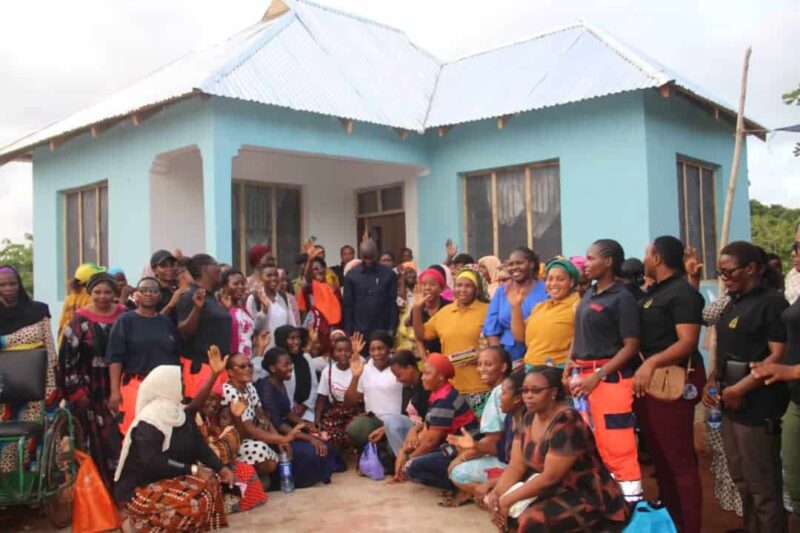Stories from Tanzanian journalists trained by Internews are bringing positive change to the lives of people with disabilities. Each journalist attended workshops organised by Internews’ Inclusive Media project, where they acquired new skills to cover key issues such as mobility, discrimination, and access to information. The positive impact of their work has surprised the journalists – and their sources – in the best possible way.
In 2021, Mtwara Press Club’s Bryson Mshana wrote about a family of people with disabilities, all living in poverty, and says he was surprised by what happened next:
“The leader of a local women’s group called me and said they were going to build a proper house for the family. I was so excited to discover that my work could bring a glimmer of hope and joy!”
The house was built and handed over to Zainab Chikaoneka and her family. In Bryson’s follow-up story, Zainab says she never expected anyone to help and this is a miracle.
Duly inspired, Mshana continues to report on people with disabilities and recently wrote about Rozina Steven, a child who needed help to get around. Members of Tanzania Women’s Union in Mtwara saw the story and donated a wheelchair to Rozina.
Another journalist trained by Internews on disability reporting is Salim Hamad, who now covers similar stories for Zanzibar’s Jicho Letu TV. Recently, he heard about a young girl with a disability who had dropped out of school because it was too far to walk. Salim’s story went viral on WhatsApp and caught the eye of a kind-hearted reader who contacted Salim and gave a bicycle to the girl. She’s now back at school.
After Uhuru newspaper’s Constantine Mathias attended Internews’ training on disability issues, she reported on Sospeter Mpilima, a six-year-old boy with a clubfoot, living in Shinyanga. Constantine wrote about how early treatment can prevent this becoming a permanent disability and her story was spotted by an anonymous benefactor who offered to help the youngster. Sospeter’s father Amos says they can’t believe their luck: “We’re so happy. Without this story, my child would have become permanently disabled, it’s as simple as that.”
Meanwhile in Tabora, community radio journalist Vivian Pyuza says, “I saw a woman with disabilities struggling with her daily activities. I broadcast her story on our station, CG FM, and some of our listeners got in touch later to give her a motorized wheelchair.”
One of the things Tanzanian journalists learn at Internews training sessions is that stories about intellectual disabilities require a different approach, because that problem is less visible. Amour Khamis attended the sessions and later produced a story for Zanzibar Cable TV about local discrimination against people with intellectual disabilities. Amour travelled to Kiboje village in Unguja South to meet a mother living in one room with four children, all with intellectual disabilities.
Amour’s powerful report caught the attention of several donors including a powerful person – Zainab Kombo Shaibu, a wife of the first vice president of Zanzibar – who decided to help with food, money, and is planning to fundraise to build a new house for the family. Amour says the Internews training changed how she works, with dramatic results:
“I learned how to frame a narrative, how to produce stories that will help people. I’m so pleased with the impact! I just want to do only these reports from now on, because they change lives.”
During the Internews training sessions, Shinyanga Press journalist Marco Maduhu learned that people with disabilities face problems not only of mobility and prejudice, but also of information – or rather the lack of it. The training helped him to write a story about how most people with disabilities are unaware of the government’s subsidized start-up program offering loans at two per cent interest, a relatively low rate. Sure enough, after a group of people with disabilities read Marco’s story, they applied for and received a loan of Tsh 3m (USD 1,290), which enabled them to launch a pig farm.
Marco’s next story highlighted poor infrastructure at Bwangija Primary School in Shinyanga, and the difficulties it posed for pupils with disabilities. After his story was published, the government intervened to improve accessibility at the school. Marco says the Internews sessions helped him to help others:
“My Internews mentor guided me to start writing about people with disabilities and I’m very happy with the impact of my reports.”
Each of these stories reveal how content produced through Internews training is not only increasing awareness and understanding of disability issues, but inspiring people to act. The results speak for themselves and have convinced editors and journalists to work together on these stories, to include people with disabilities as news sources, and to help increase the quantity and quality of such coverage in Sub-Saharan Africa.
